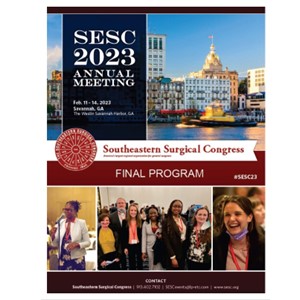General Surgery
Category: Resident Forum
Quickshot Oral : Resident Forum
RF 6 - COVID-INDUCED ALTERATIONS IN SURGICAL CARE: PERFORATED DIVERTICULITIS AS A MODEL
Saturday, February 11, 2023
9:45am - 10:00am East Coast USA Time
- EG
Emily A. Grimsley, MD
Resident Physician
University of South Florida, United States - EG
Emily A. Grimsley, MD
Resident Physician
University of South Florida, United States
Presenter(s)
Principal Contact(s)
Objectives: COVID-19 caused healthcare systems to alter traditional processes of care. Literature on the pandemic’s effect on healthcare processes and resulting surgical outcomes is lacking. Using COVID prevalence as a surrogate for different healthcare processes during the pandemic, this study aims to determine outcomes of open colectomy in patients with perforated diverticulitis (PDiv).
Methods: Using CDC data, COVID mortality per three-month quarter was calculated in Florida. The quarters with the three highest and three lowest mortality rates were used to establish the COVID-heavy (CH) and COVID-light (CL) timeframes, respectively. Three quarters of 2019 were used for the pre-COVID (PC) timeframe. Florida AHCA database was queried using ICD-10 codes to identify PDiv patients who underwent open colectomy and/or colostomy creation. Primary outcomes were length of stay (LOS), morbidity, and mortality. Stepwise linear and logistic regression and gradient boosting machine (GBM) models with 10-fold cross-validation determined pre-operative factors most impacting outcomes. A parallel analysis excluding COVID+ patients was performed to differentiate COVID-infection from processes of care.
Results: There were 3,814 patients total, evenly distributed per timeframe: PC 1,238, CH 1,283, CL 1,293. Mortality was significantly higher during COVID: PC 2.4%, CH 4.9%, CL 3.8% (p=0.004). Stepwise regression revealed COVID+ led to longer LOS (p < 0.001), higher morbidity (OR 3.12, p< 0.001) and mortality (OR 7.99, p< 0.001). After excluding 104 COVID+ patients, primary outcomes were not different per timeframe. Increased morbidity was associated with Age 71-90 (OR 10.32, p< 0.001), history of congestive heart failure (CHF; OR 4.17, p< 0.001) and Charlson Comorbidity Index (CCI) >2 (OR 2.47, p< 0.001); these three variables accounted for 76% of the relative influence on morbidity. For morbidity, regression accuracy was 0.73 (95% CI 0.71-0.74, F1 0.56) and GBM accuracy was 0.73 (95% CI 0.72-0.74, F1 0.56). Mortality was most impacted by CCI>2 (OR 6.2, p< 0.001), history of myocardial infarction (OR 5.01, p< 0.001) and CHF (OR 2.58, p< 0.001); these three variables account for 87% of the relative influence on mortality. For mortality, regression accuracy was 0.97 (95% CI 0.96-0.97, F1 0.02), GBM accuracy was 0.97 (95% CI 0.96-0.97, F1 NA).
Conclusion: Outcomes following colectomy for PDiv were worse for COVID+ patients. Despite increased stress on the healthcare system during the COVID-19 pandemic, outcomes were unchanged for COVID-negative patients. Our results indicate that despite COVID-associated change in delivery of care, acute care surgery can still be performed in COVID-negative patients without increased morbidity or mortality.
Methods: Using CDC data, COVID mortality per three-month quarter was calculated in Florida. The quarters with the three highest and three lowest mortality rates were used to establish the COVID-heavy (CH) and COVID-light (CL) timeframes, respectively. Three quarters of 2019 were used for the pre-COVID (PC) timeframe. Florida AHCA database was queried using ICD-10 codes to identify PDiv patients who underwent open colectomy and/or colostomy creation. Primary outcomes were length of stay (LOS), morbidity, and mortality. Stepwise linear and logistic regression and gradient boosting machine (GBM) models with 10-fold cross-validation determined pre-operative factors most impacting outcomes. A parallel analysis excluding COVID+ patients was performed to differentiate COVID-infection from processes of care.
Results: There were 3,814 patients total, evenly distributed per timeframe: PC 1,238, CH 1,283, CL 1,293. Mortality was significantly higher during COVID: PC 2.4%, CH 4.9%, CL 3.8% (p=0.004). Stepwise regression revealed COVID+ led to longer LOS (p < 0.001), higher morbidity (OR 3.12, p< 0.001) and mortality (OR 7.99, p< 0.001). After excluding 104 COVID+ patients, primary outcomes were not different per timeframe. Increased morbidity was associated with Age 71-90 (OR 10.32, p< 0.001), history of congestive heart failure (CHF; OR 4.17, p< 0.001) and Charlson Comorbidity Index (CCI) >2 (OR 2.47, p< 0.001); these three variables accounted for 76% of the relative influence on morbidity. For morbidity, regression accuracy was 0.73 (95% CI 0.71-0.74, F1 0.56) and GBM accuracy was 0.73 (95% CI 0.72-0.74, F1 0.56). Mortality was most impacted by CCI>2 (OR 6.2, p< 0.001), history of myocardial infarction (OR 5.01, p< 0.001) and CHF (OR 2.58, p< 0.001); these three variables account for 87% of the relative influence on mortality. For mortality, regression accuracy was 0.97 (95% CI 0.96-0.97, F1 0.02), GBM accuracy was 0.97 (95% CI 0.96-0.97, F1 NA).
Conclusion: Outcomes following colectomy for PDiv were worse for COVID+ patients. Despite increased stress on the healthcare system during the COVID-19 pandemic, outcomes were unchanged for COVID-negative patients. Our results indicate that despite COVID-associated change in delivery of care, acute care surgery can still be performed in COVID-negative patients without increased morbidity or mortality.

